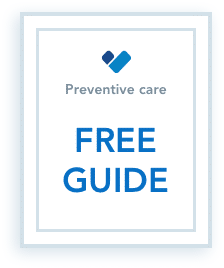What you need to know about pre-existing conditions and health insurance
Are you worried about paying higher premiums for health insurance as a result of a medical condition you currently have or have had in the past? If so, you don’t have to be. Thanks to the Affordable Care Act, health insurance companies cannot deny you coverage or discriminate against you due to a pre-existing condition. The ACA made it possible for more than 50 million Americans to get health insurance that was once inaccessible.
Grab our free guide to all of the essential health benefits that the Affordable Care Act mandates that health insurance plans must cover.
Here’s what you need to know about pre-existing conditions and health insurance.
What is a pre-existing condition?
A pre-existing condition is any kind of health condition you might have had before the date at which a new health insurance plan starts. From asthma to pregnancy, and cancer to diabetes, depression to endometriosis, there are countless numbers of pre-existing conditions.
The good news comes in the form of the Obama administration’s Affordable Care Act (ACA). Because of the ACA, health insurance companies can no longer deny you coverage or charge you more for that coverage because you have a pre-existing condition. The ACA also put in place annual and lifetime maximums. This means there’s now a cap on the amount a person can pay out-of-pocket for medical care. If you have a pre-existing condition that requires ongoing treatment, you don’t have to worry about being stuck with a literally infinite bill.
And the other good news is that if you have a pre-existing condition, you’re not alone. Half of all Americans are living with something that would have been classified as a pre-existing condition and could have potentially ended their ability to get affordable health insurance before the passage of the ACA.
Even more good news. Once you’re covered under a health insurance plan, your coverage for a pre-existing condition begins immediately.
To see plans and prices in your area, and to see how much of a subsidy you might be eligible for (94% of users are eligible for a subsidy), enter your zip code below.
What are the most common pre-existing conditions?
While there are seemingly countless numbers of pre-existing conditions, some are especially prevalent. If you have or have ever had acne, anxiety, depression, diabetes, asthma, sleep apnea, COPD, obesity, clogged arteries (atherosclerosis), or cancer, then you have had one of the ten most common pre-existing conditions.
There are a number of other common health conditions that also would have qualified as a pre-existing condition. Pregnancy is classified as a pre-existing condition. Eating disorders are also pre-existing conditions, as is arthritis and even having had a knee replacement. HPV, which in some strains can be cancer-causing if left untreated, could also be classified by insurance companies as a pre-existing condition. If you have had a back injury following some kind of accident, that might be classified as a pre-existing condition. Alcohol or drug abuse, Crohn’s disease and celiac disease all also have a history of being classified as pre-existing conditions. Along with Alzheimer’s, cerebral palsy, epilepsy, kidney disease, lupus, obsessive-compulsive disorder, multiple sclerosis, organ transplant, Parkinson’s disease, and strokes.
Before the ACA, having any of these would have impacted your ability to get health insurance. And even if you could get health insurance, you might have paid more for it.
Pre-existing conditions could once again create a major barrier to affordable health care if Obamacare is repealed.
What do I need to know about the Affordable Care Act and pre-existing conditions?
One of the key wins of the Affordable Care Act was ending discrimination based on pre-existing conditions. Because of this, insurance companies no longer can deny someone coverage because of a pre-existing condition. They also can’t charge them more for their health insurance because of one.
That means today, pre-existing conditions cannot prevent you from getting insurance. Your insurance must also cover pre-existing conditions. The ACA also ensures that the cost of managing those pre-existing conditions comes with annual and lifetime maximums. And this is a key protection for not only people’s physical health, but financial health.
The Affordable Care Act also ensures the following consumer protections:
Can I be denied health insurance because of a pre-existing condition?
As a result of the Affordable Care Act, you cannot be denied health insurance because of a pre-existing condition. You also have the security of accessing coverage for that condition as soon as your health insurance plan begins. This rule went into effect in July of 2014 and is still in effect today.
For example, pregnancy is a pre-existing condition, so coverage of a pregnancy starts the same day your plan starts too. If you’re pregnant when you apply for health insurance, as of now you can’t be denied coverage or charged more for your health insurance. So, all care for your pregnancy and delivery will be covered from the day your plan starts. Also, don’t forget that welcoming a new baby also makes you eligible for a Special Enrollment Period, and if you sign up for new coverage then, it will start from the day of a child’s birth or adoption. This is true even if you don’t sign up until the end point of your 60-day Special Enrollment Period.
What type of health insurance covers pre-existing conditions?
Per federal law, all ACA-compliant plans, including those offered by employers and through the online Health Insurance Marketplace, must cover pre-existing conditions. Other more predatory plans, such as short term health insurance or healthcare-sharing ministries, don’t cover pre-existing conditions and don’t have the consumer protections that Marketplace plans (aka Obamacare or Affordable Care Act plans) do.
Need help in comparing your options among these kinds of plans? Not sure how to shop the Marketplace to find the ACA-compliant plan that’s best for you? Don’t worry: The HealthSherpa Consumer Advocate Team can help. You can speak to a HealthSherpa Consumer Advocate by calling (872) 228-2549.
Medicaid and CHIP (Children’s Health Insurance Program) also must comply with the ACA. This means they can’t refuse you coverage or charge you more because of a pre-existing condition. These insurance programs also must cover any pre-existing conditions you have once your coverage begins. See if you’re eligible for Medicaid or Marketplace subsidies here.
Do all health insurance companies cover pre-existing conditions?
All Marketplace plans must cover pre-existing conditions. That means that any health plan you buy through HealthSherpa or HealthCare.gov covers pre-existing conditions. And that coverage of your condition starts the very day your insurance starts.
The only exception are grandfathered plans. A grandfathered plan is one that was bought on or before March 23, 2010. These plans are not plans that were ever sold through the online Marketplace. Instead, these plans were sold by individual insurance companies, agents, or brokers. And these plan may or may not include all of the rights and protections guaranteed by the Affordable Care Act. And this includes the ACA’s provision regarding pre-existing conditions. So, if you have a grandfathered plan, know it may not cover your pre-existing condition. It also might charge you more for the coverage of a pre-existing condition.
And any plan that is classified as a “grandfathered” plan must clearly disclose this fact to consumers. If you’re on a group health plan through your employer, pay attention to the information you get when you enroll. The date you joined the plan may not reflect the date your plan was created. Be sure to check with your HR department to find out if your employer-provided insurance is a grandfathered plan.
Will I have to pay higher monthly premiums if I have a pre-existing condition?
Thanks to the Affordable Care Act, any ACA-compliant plan may not charge you more for your coverage because you have a pre-existing condition. And this is true whether you have private insurance through your employer, purchase a plan through the Marketplace, or have Medicaid or CHIP coverage.
What do I need to know about the Trump Administration and pre-existing conditions?
The ACA is currently the law of the land. However, President Trump and GOP leaders in Congress have repeatedly sought to challenge the law. While running for office, President Trump campaigned on his wanting to see the ACA overturned entirely. Should this happen, this would also mean the potential loss of pre-existing condition protections for Americans’ health insurance.
Thought Trump and Republicans have said that any replacement to the ACA would cover pre-existing conditions, this isn’t entirely accurate.
GOP alternatives
House Republicans’ proposed alternative to the Affordable Care Act (ACA) was the American Health Care Act (AHCA). The AHCA requires that insurers not deny people coverage based on pre-existing conditions. However, allows them to charge consumers more for their coverage if they have pre-existing conditions. The bill also allows insurance companies to charge even more on top of that if someone with a pre-existing condition has not maintained continuous coverage before enrolling in new insurance. And considering that half of all Americans have something that could be classified as a pre-existing condition, the AHCA could have a pretty dramatic impact on Americans’ health and wallets.
In the Senate, Republicans proposed the Better Care Reconciliation Act (BCRA). This would require insurance companies to not deny people coverage based on pre-existing conditions. But also allow them to sell non-compliant plans on the Marketplace, too, that could deny or charge more for coverage as a result of pre-existing conditions. This would likely create a scenario that dramatically impacts the health insurance market. In this scenario, the majority of people without pre-existing conditions buy a cheaper, non-compliant plan, leaving those with pre-existing conditions with plans that have to be much more expensive by default, without a broader risk pool of insured people to help balance out costs and risks.
And yet another Senate Republican plan, known as the Graham-Cassidy legislation, would let insurers base premium amounts on what they calculate a person’s “health status” to be. The only things insurance companies couldn’t charge more for under this plan would be gender or genetics. So those with pre-existing conditions might pay more for their health insurance.
None of these plans have passed, so the Affordable Care Act is still in effect, although without the individual mandate.
Public health consequences
Repealing the ACA would come with other problems for people’s healthcare, too.
Right now, the ACA guarantees that a number of essential health benefits are free to access under your health insurance plan. This means that your insurance policy must cover a number of basic, comprehensive healthcare services. And any of these services that are preventive must be free to consumers.
Under the ACA, there are currently 66 health services that are completely free for everyone with health insurance. Meaning that more Americans can access this care without fear of dealing with costs. They also don’t need to worry about a pre-existing condition exclusion (a waiting period for care related to a pre-existing condition). More Americans can now see their doctor without this type of waiting period. And with more people cared for, and covered, and actively seeking out preventive care and managing the conditions they have, we end up with a healthier America. And individuals end up with less bills related to a health condition that went unmanaged, undetected, and untreated, leading to bills that mounted out of control.
For now, though, the Affordable Care Act remains the law of the land. And Democrats are continuing to fight for this to remain true. With that fact come a number of priceless protections for those with pre-existing conditions. So whether you have acne or anxiety, have recovered from an eating disorder or are preparing to welcome a baby, your insurance company cannot deny you an insurance plan or charge you more for it because of your health history. And any care you do need for any health issues you have at the time you get new insurance or have had in the past is covered, too.















Helpful
Thank you for the suggestions. Very Helpful blog.
I need insurance
You can go to healthsherpa.com to see plans and prices or call (872) 228-2549